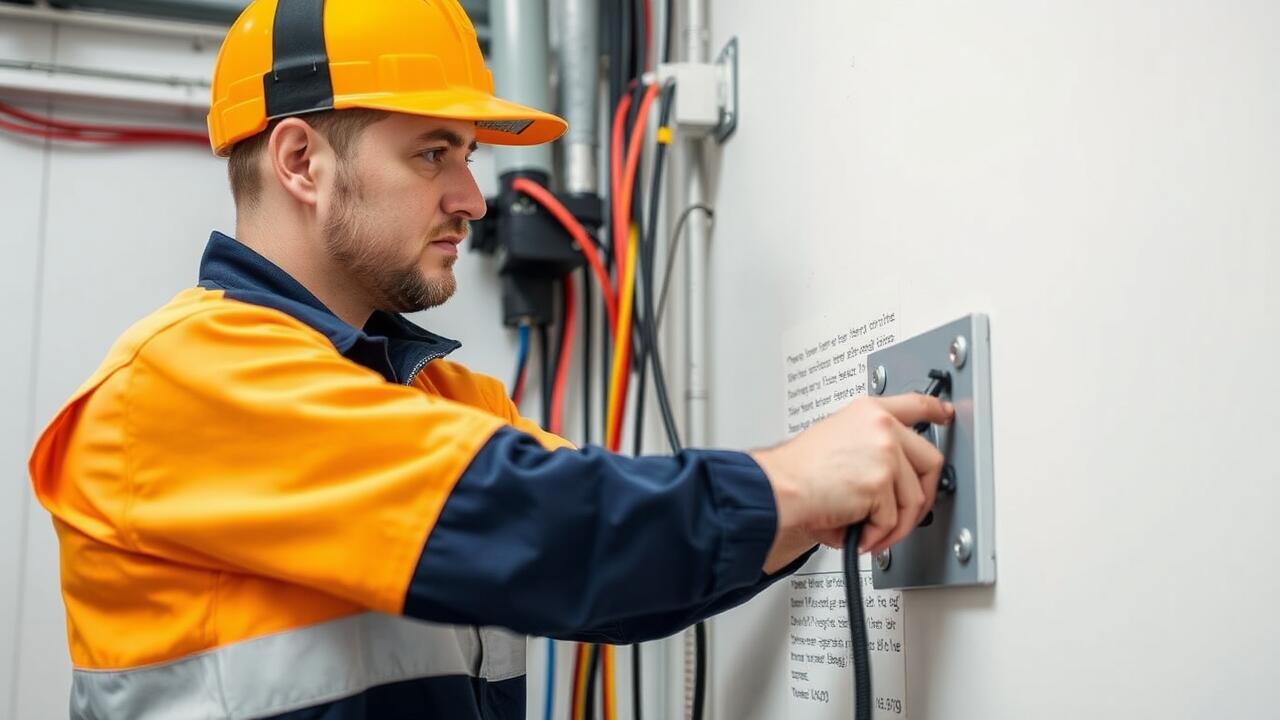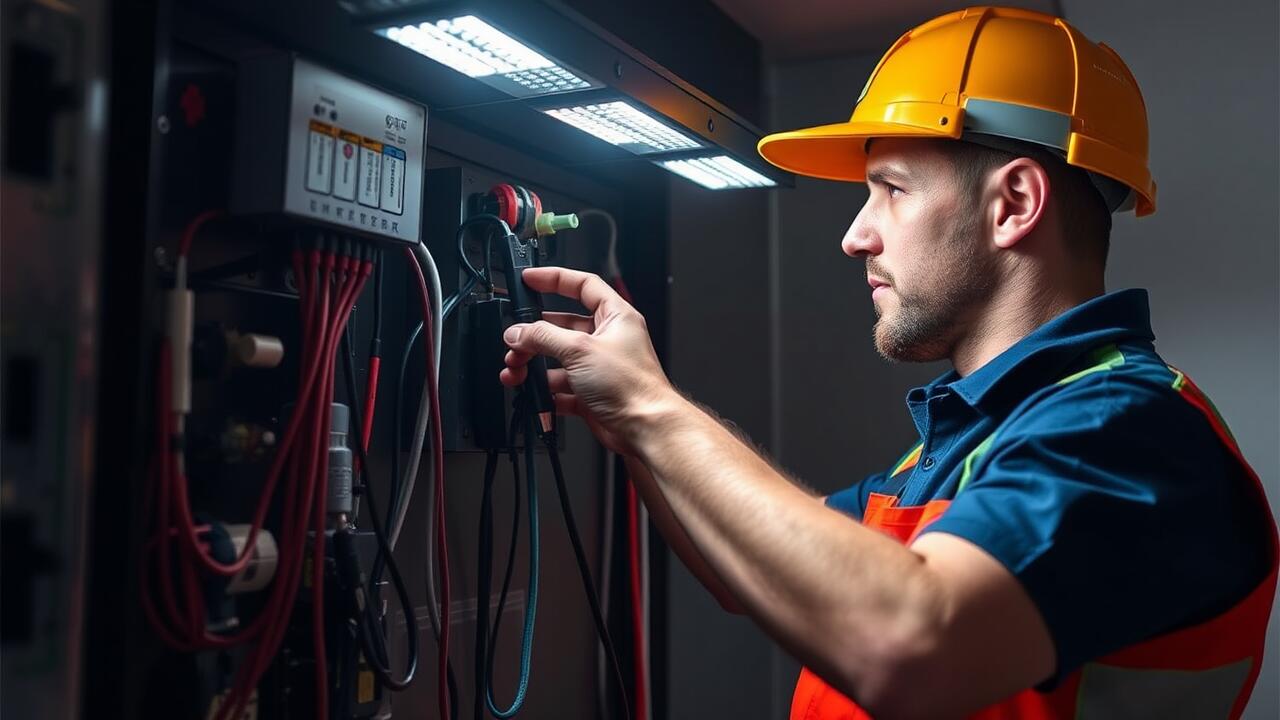
How Ground Faults are Detected
Ground faults are identified through several detection methods that aim to monitor electrical currents for abnormalities. One popular technique involves using ground fault circuit interrupters (GFCIs), which automatically cut off power when they detect an imbalance in the current. Modern systems can incorporate advanced sensors and smart technology, allowing for real-time monitoring and alerting users to potential issues before they escalate. These innovations are particularly beneficial for professionals engaged in Electrical Repairs in Bellaire Junction, Houston, as they enhance safety and minimize equipment damage.
Another crucial method of detection involves regular inspection and maintenance of electrical systems. Electricians utilize various tools to measure insulation resistance and identify any signs of wear or degradation in wiring. Continued advancements in infrared thermography and ultrasonic testing provide additional dimensions to traditional methods. Implementing these practices ensures early identification of ground faults, thereby preserving system integrity and safeguarding against serious hazards in both residential and commercial settings.
Detection Methods and Technologies
One effective method for detecting ground faults is the use of ground fault circuit interrupters (GFCIs). These devices monitor the current flowing through a circuit and can quickly identify any imbalances. When a fault is detected, the GFCI automatically shuts off the power, preventing potential electrical shock or fire hazards. Regular testing of GFCIs ensures their reliability. Homeowners and electricians alike should familiarize themselves with these devices to enhance safety in residential and commercial spaces.
Another advanced detection technology involves the implementation of smart sensors and monitoring systems. These devices leverage real-time data to assess the electrical flow and identify disruptions indicative of ground faults. They can be integrated into broader electrical management systems, providing alerts and diagnostics that facilitate timely electrical repairs in Gulfton, Houston. Utilizing such technology not only enhances safety but also contributes to energy efficiency by minimizing downtime during potential faults.
Ground Fault Prevention Techniques
Preventing ground faults is essential for maintaining the safety and integrity of electrical systems. One effective technique is to ensure that all electrical installations are grounded properly. This involves connecting the electrical system to the ground to provide a safe path for any excess electrical energy. Regularly inspecting outlets, wiring, and connections helps identify wear or deterioration that could lead to grounding issues. Additionally, using ground fault circuit interrupters (GFCIs) in areas prone to moisture can significantly reduce the risk of ground faults.
Another important aspect of prevention is adhering to best practices during installation and maintenance. Electricians should always follow the National Electrical Code (NEC) guidelines when working on electrical systems. This includes using appropriate materials and techniques designed to minimize the risk of ground faults. Homeowners in need of professional assistance can rely on services like Electrical Repairs in Westchase, Houston, which provide skilled technicians who understand and implement these safety measures effectively. Regular maintenance checks and prompt repairs are crucial for ensuring long-term safety and performance in electrical installations.
Best Practices for Electrical Safety
Ensuring electrical safety in residential and commercial settings requires a proactive approach. Regular maintenance and inspections can help identify potential hazards before they escalate into serious problems. Avoid overloading circuits, as this can lead to overheating and increase the risk of ground faults. Utilizing circuit breakers and ground fault circuit interrupters (GFCIs) can provide an extra layer of protection. Homeowners should educate themselves about the critical role these devices play in preventing electrical accidents.
When operating in areas with a high risk of moisture exposure, it is crucial to implement additional safety measures. Using weatherproof outlets and keeping electrical cords off the ground can help minimize exposure to water. For those residing in areas like Westchase, Houston, finding professionals for Electrical Repairs in Westchase, Houston, ensures that installations and repairs meet safety standards. Staying updated on local electrical codes and regulations provides further assurance that safety practices are up to date and effective.
Legal Regulations Regarding Ground Faults
Regulatory frameworks governing electrical safety are designed to mitigate the risks associated with ground faults. In many jurisdictions, codes establish guidelines for the installation and maintenance of electrical systems, ensuring proper grounding and bonding. These regulations often require the use of ground fault circuit interrupters (GFCIs) in specific locations, such as kitchens and bathrooms, where the risk of electrical shock is heightened. Adhering to these standards plays a critical role in enhancing safety and preventing accidents in residential and commercial properties.
Professionals engaged in electrical repairs are responsible for ensuring that their work complies with local codes and regulations. Regular inspections and updates to aging electrical systems help maintain safety standards. In Clear Lake City, Houston, licensed electricians must stay abreast of any changes in the legal landscape regarding electrical safety. This vigilance ensures that all electrical repairs in Clear Lake City, Houston, are conducted safely and in accordance with current regulations, ultimately protecting both residents and property from potential hazards.
Compliance with Electrical Codes
Compliance with electrical codes is critical for ensuring safety and preventing ground faults in electrical systems. These codes are designed to establish minimum standards for the design, installation, and maintenance of electrical systems. Adhering to these regulations helps protect both property and individuals from potential electrical hazards. Regulations may vary by region, necessitating that contractors and homeowners familiarize themselves with local codes to avoid violations.
In areas like Sharpstown, Houston, following electrical codes is particularly important due to the diverse range of electrical installations and repairs. Electrical repairs in Sharpstown, Houston, must meet specific criteria to ensure the safety of residents. By consistently complying with electrical codes, professionals can provide peace of mind, ensuring that systems are not only functional but also safe for everyday use. Regular inspections and updates to systems may be required to maintain compliance and reduce the risk of ground faults.
FAQS
What is a ground fault in an electrical system?
A ground fault occurs when there is an unintended connection between an electrical conductor and the ground, which can lead to electric shock, equipment damage, or fire hazards.
How are ground faults detected?
Ground faults can be detected using various methods and technologies, including ground fault circuit interrupters (GFCIs), insulation resistance testing, and advanced monitoring systems that analyze current flow.
What are some common ground fault prevention techniques?
Common prevention techniques include installing GFCIs in wet areas, ensuring proper grounding of electrical systems, conducting regular inspections and maintenance, and educating users about electrical safety.
Are there specific legal regulations regarding ground faults?
Yes, there are legal regulations and electrical codes that govern the installation and maintenance of electrical systems to prevent ground faults, which vary by jurisdiction but typically align with the National Electrical Code (NEC) in the United States.
What are best practices for ensuring electrical safety from ground faults?
Best practices include regularly testing GFCIs, maintaining clear access to electrical panels, using appropriate personal protective equipment, and having a qualified electrician conduct routine inspections of the electrical system.




